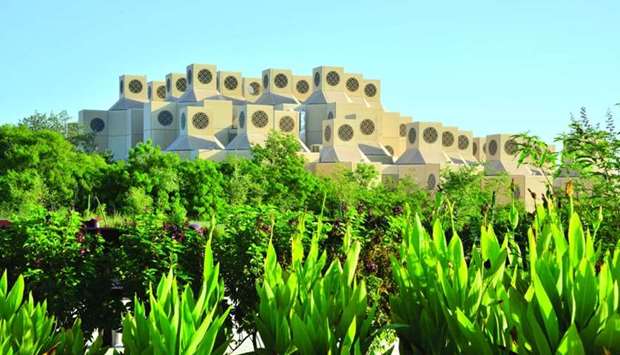Qatar University (QU) has announced that it is continuing to support its research community with a total of 74 newly awarded projects for the new cycle. An online event was held on Wednesday to announce the Cycle 4 Internal Grant Awards in the presence of Prof Mariam al-Maadeed, vice-president for Research and Graduate Studies at QU.
QU said it also continues its efforts to support students in their research work by funding about 250 students each year through different grants. "Qatar University continues to strive for excellence through its efforts in education and research, while serving the local and international community, in addition to working to contribute to achieving Qatar National Vision 2030," QU said in a statement, stressing that the university's support for the research community continued despite the challenges posed by the Covid-19 outbreak.
The event started with a preview of the submitted grants. Globally, most of the programmes saw an important increase in the total number of submissions compared to the last cycle, with the total reaching 267 this year, the statement noted. For example, the High Impact Grant submissions increased from seven to 27 submissions with six awarded projects, while the Collaborative Grant submissions saw a rise of 70% with a total of 18 awarded projects.
The College of Engineering (CENG) and College of Arts and Sciences (CAS) led the way by collectively claiming around 50% of the total submitted grants. In terms of research fields, most of the submitted proposals pertained to the Health & Biomedical Sciences and Energy & Environment research pillars of the university.
Due to the exceptional circumstances brought about by Covid-19, the Office of Research Support recently established two specific short lifecycle grants as part of an international research effort to deal with the virus and support the speed of rapid scientific research initiatives. The Qatar University Emergency Response Grant (ERG) provides a bridge support to new and early-stage investigations. It supported nine projects covering five research areas: basic molecular research, clinical research, social-behavioural research, infectious disease epidemiology and e-health.
The Concept Development: Emergency Response grant (CD-ER) deals with the high demand for innovative solutions. CD-ER is intended to enable the development of innovative prototypes, processes and innovative platforms. It covered seven additional awarded projects.
Beyond studying the virus from different perspectives, QU researchers contribute to enhance proper protection plans and awareness, in addition to highlighting the role of the university in addressing such emerging concerns. The International Collaboration, through the International Research Collaboration Co-Fund (IRCC), remains "highly attractive" with new submissions from Canada, Malaysia, Turkey, China, Norway, Poland, France, Ukraine, Italy, Australia, the UK and US, totaling 13 new co-funded projects. This year, QU has also strengthened its specific IRCC Strategic Track with Oman with four additional co-funded projects.
From the industry side, QU has initiated the new Qafco Research and Development Grant (QRDG) in collaboration with Qatar Fertiliser Company (Qafco). The grant targets faculty and students from different fields of research, and supports the Qafco strategy in creating knowledge, contributing to enable Qatar becoming self-sufficient and building a knowledge-based economy to achieve Qatar National Vision 2030.
The event started with a preview of the submitted grants. Globally, most of the programmes saw an important increase in the total number of submissions compared to the last cycle, with the total reaching 267 this year, the statement noted. For example, the High Impact Grant submissions increased from seven to 27 submissions with six awarded projects, while the Collaborative Grant submissions saw a rise of 70% with a total of 18 awarded projects.
The College of Engineering (CENG) and College of Arts and Sciences (CAS) led the way by collectively claiming around 50% of the total submitted grants. In terms of research fields, most of the submitted proposals pertained to the Health & Biomedical Sciences and Energy & Environment research pillars of the university.
Due to the exceptional circumstances brought about by Covid-19, the Office of Research Support recently established two specific short lifecycle grants as part of an international research effort to deal with the virus and support the speed of rapid scientific research initiatives. The Qatar University Emergency Response Grant (ERG) provides a bridge support to new and early-stage investigations. It supported nine projects covering five research areas: basic molecular research, clinical research, social-behavioural research, infectious disease epidemiology and e-health.
The Concept Development: Emergency Response grant (CD-ER) deals with the high demand for innovative solutions. CD-ER is intended to enable the development of innovative prototypes, processes and innovative platforms. It covered seven additional awarded projects.
Beyond studying the virus from different perspectives, QU researchers contribute to enhance proper protection plans and awareness, in addition to highlighting the role of the university in addressing such emerging concerns. The International Collaboration, through the International Research Collaboration Co-Fund (IRCC), remains "highly attractive" with new submissions from Canada, Malaysia, Turkey, China, Norway, Poland, France, Ukraine, Italy, Australia, the UK and US, totaling 13 new co-funded projects. This year, QU has also strengthened its specific IRCC Strategic Track with Oman with four additional co-funded projects.
From the industry side, QU has initiated the new Qafco Research and Development Grant (QRDG) in collaboration with Qatar Fertiliser Company (Qafco). The grant targets faculty and students from different fields of research, and supports the Qafco strategy in creating knowledge, contributing to enable Qatar becoming self-sufficient and building a knowledge-based economy to achieve Qatar National Vision 2030.

